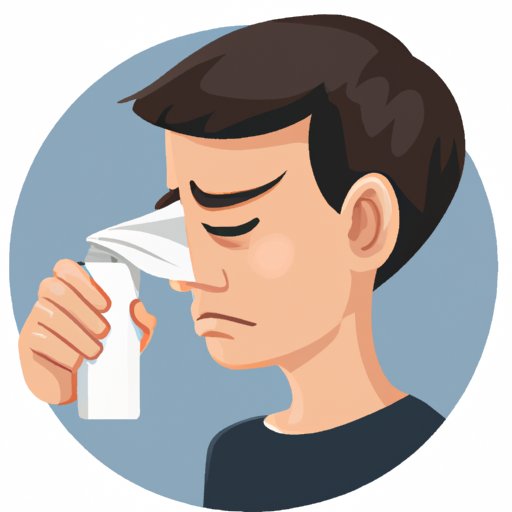Introduction
Nosebleeds can be a scary and unsettling experience, especially when they happen unexpectedly. Fortunately, there are several easy natural remedies and steps you can take to help stop nosebleeds fast. In this article, we will explore the different ways to stop a nosebleed, natural remedies, how to prevent nosebleeds, and when to seek medical attention. We will also discuss the science behind why nosebleeds occur and famous nosebleed incidents in history.
5 Easy Steps to Stop a Nosebleed Fast
When a nosebleed strikes, remain calm and follow these five easy steps to stop it:
1. Sit forward and upright: Sitting in this position helps reduce blood pressure in the veins that are in the nose, making it less likely that you will bleed.
2. Pinch your nostrils: Using your thumb and pointer finger, pinch your nostrils against the cartilage. Continue to breathe through your mouth.
3. Apply a cold compress: Placing a cold compress, such as a bag of frozen peas or a cold towel, on the bridge of your nose can help reduce swelling and promote clotting.
4. Avoid blowing your nose: Blowing your nose can cause the clot to come loose and trigger more bleeding.
5. Stay calm and patient: Nosebleeds can be frightening, but it’s important to remain calm and patient. Most nosebleeds stop within a few minutes.
Natural Remedies for Nosebleeds
If you’re looking for natural remedies to help reduce the frequency and severity of nosebleeds, try the following:
1. Use a humidifier: Dry air is a common trigger for nosebleeds. Using a humidifier at home can help keep nasal passages moist and reduce the likelihood of a nosebleed.
2. Drink more water: Dehydration can make blood vessels in the nose more susceptible to rupture. Drinking enough water throughout the day can help prevent nosebleeds.
3. Apply a cool compress: As mentioned earlier, a cold compress can help promote clotting and reduce swelling.
4. Try saline sprays: Saline sprays can be used to help moisturize nasal passages, which can be especially helpful in dry climates or during the winter months.
5. Eat vitamin C-rich foods: Vitamin C helps with the formation of collagen, which plays an important role in maintaining the integrity of blood vessels. Adding more vitamin C-rich foods to your diet can help reduce the likelihood of nosebleeds.
When to Seek Medical Attention for a Nosebleed
In most cases, nosebleeds are not serious and can be treated at home. However, in rare cases, nosebleeds can be a sign of a more serious underlying condition, such as high blood pressure, blood disorders, or even cancer.
If you experience any of the following symptoms, you should seek medical attention immediately:
– The bleeding lasts longer than 20 to 30 minutes
– You’re having trouble breathing
– You’ve lost a significant amount of blood
– You’re feeling lightheaded or dizzy
– The nosebleed was caused by an injury to the head or face

The Science Behind Nosebleeds
Nosebleeds occur when the delicate blood vessels in the nasal cavity become damaged or irritated. This can be caused by a variety of factors, including dry air, allergies, nose-picking, high blood pressure, and even certain medications.
The nose is filled with blood vessels that are close to the surface, making it more susceptible to bleeding. The interior of the nose is also lined with a thin layer of tissue called the nasal mucosa, which is rich in blood vessels. When these vessels are damaged or ruptured, it can cause a nosebleed.
Nosebleeds: Prevention and Management
Preventing nosebleeds involves taking steps to keep the nasal passages healthy and well-moisturized. This can include staying hydrated, avoiding irritants like smoke or chemicals, and using a humidifier in dry climates.
If you do experience a nosebleed, there are several management techniques you can try. These include applying pressure to the nose, using special nasal sprays, or even undergoing a medical procedure to seal off the blood vessels that are causing the bleeding.
Famous Nosebleed Incidents Throughout History
Finally, it’s worth noting that nosebleeds have affected some famous historical figures. Napoleon Bonaparte, for example, was known to suffer from nosebleeds during battle. John F. Kennedy also experienced a nosebleed during a debate with Richard Nixon in 1960.
While nosebleeds can be alarming, they are typically not serious and can be treated quickly and easily. By following the tips and remedies outlined in this article, you can take steps to prevent nosebleeds from occurring and manage them when they do happen.
Conclusion
In conclusion, nosebleeds are a common occurrence and can be caused by a variety of factors. By following the steps outlined in this article, you can stop a nosebleed quickly and naturally. If you experience more severe symptoms or are concerned about an underlying condition, it’s always best to seek medical attention. With proper prevention and management techniques, you can reduce the frequency and severity of nosebleeds and enjoy a healthier, happier life.
